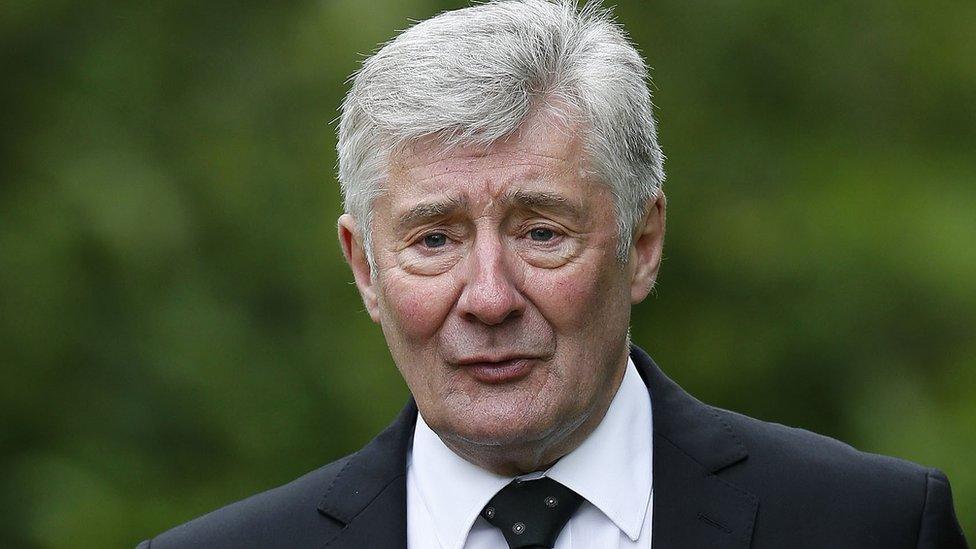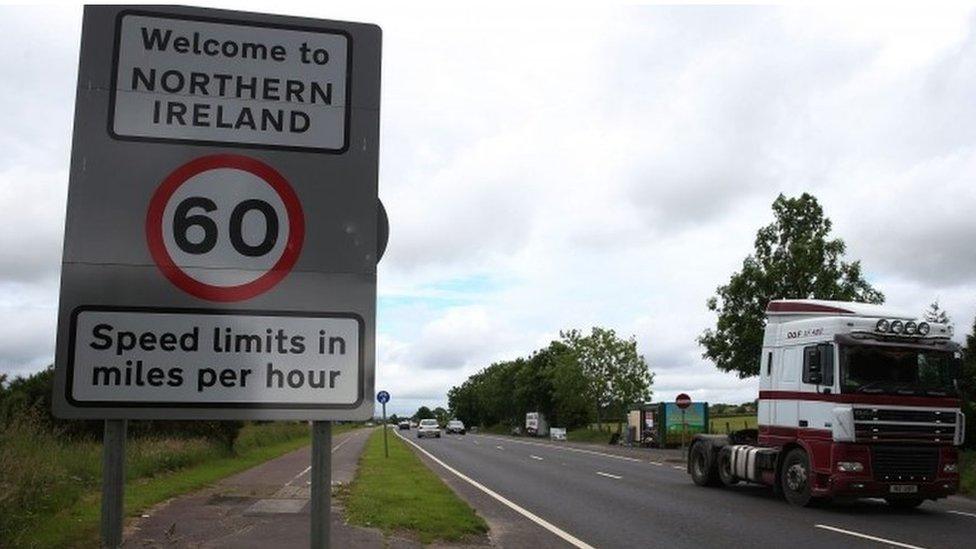Brexit border plan 'must be longer-term' says Tony Lloyd
- Published
- comments

Tony Lloyd says the government's proposal needs fleshing out
The shadow NI Secretary has said the government must take a longer-term approach in its Brexit customs proposals to avoid a hard Irish border.
Theresa May's cabinet agreed on a new proposal on Thursday.
Ministers signed off on the "backstop" that would see the UK match EU tariffs after 2020, if there is no deal on their preferred customs arrangements.
However, Labour's Tony Lloyd said that was only a temporary continuation.
He added that there should be a fresh general election if the government cannot agree a permanent deal.
"If I was an investor looking to invest in my own constituency here in Rochdale, or for that matter anywhere across Northern Ireland, I'd want a bit more certainty about how long this is going to last," he said.
"We've got to have some real fleshing out, because no hard border is not just for 2019, 2020, it's got to be into the long future."
What is the EU customs union?
He added: "We would oppose a hard border, because it is perfectly possible negotiate with the EU round no hard border keeping the whole of the UK as one within this.
"I think what the Labour Party would be saying if the government could only negotiate that far they will have failed, the United Kingdom they would have failed actually the agreement that they have made with the EU already and we want a general election to resolve that, because in the end that would be the way forward for the whole of the country."
Government sources have told the BBC's political editor, Laura Kuenssberg, that the newly-agreed proposal was very unlikely to be needed - as they are confident a customs deal that avoids bringing back a hard border can be agreed with the EU.
If the UK stayed in a customs union with the EU it would help solve customs issues across the Irish border, but would not necessarily address issues related to the single market, which the UK plans to leave.
On Thursday Taoiseach Leo Varadkar said the newly-agreed customs backstop option "would help solve some of the problems related to the border but not all of them."

Analysis: More work to be done to avoid a hard border
by John Campbell, BBC News NI Economics Editor
The Irish border is frictionless for trade because of the interaction of the customs union and the single market.
In simple terms the customs union means there no tariffs to be paid, while the single market means consignments don't need to be inspected to check they meet product standards.
The backstop which has been agreed by the cabinet seemingly only deals with customs issues - on that basis it would be inadequate to guarantee no hardening of the border.
Single market rules on the imports of food and agriculture products are particularly strict and any workable border backstop would need to find a way to deal with that issue.
The Taoiseach has been clear that what's been proposed by the UK so far would help solve some of the problems related to the border but not all of them.
So after weeks of cabinet arguments on customs we could now be facing similar discussions about the single market.


Mr Lloyd said there could no hard border into the long future, not just in 2019 or 2020
Brexiteers fear the proposal amounts to staying in the customs union longer.
No 10 says the UK would still be able to sign and implement trade deals, and the measure would only last for a matter of months.
The UK is due to leave the European Union in March 2019, after which a 21-month transition period is due to begin, which aims to smooth the way to a post-Brexit relationship between the UK and EU.
Ministers are yet to settle on what permanent model they want to see replace the customs union when the UK leaves the EU.
They are under pressure to decide on their policy before a key EU summit in June.